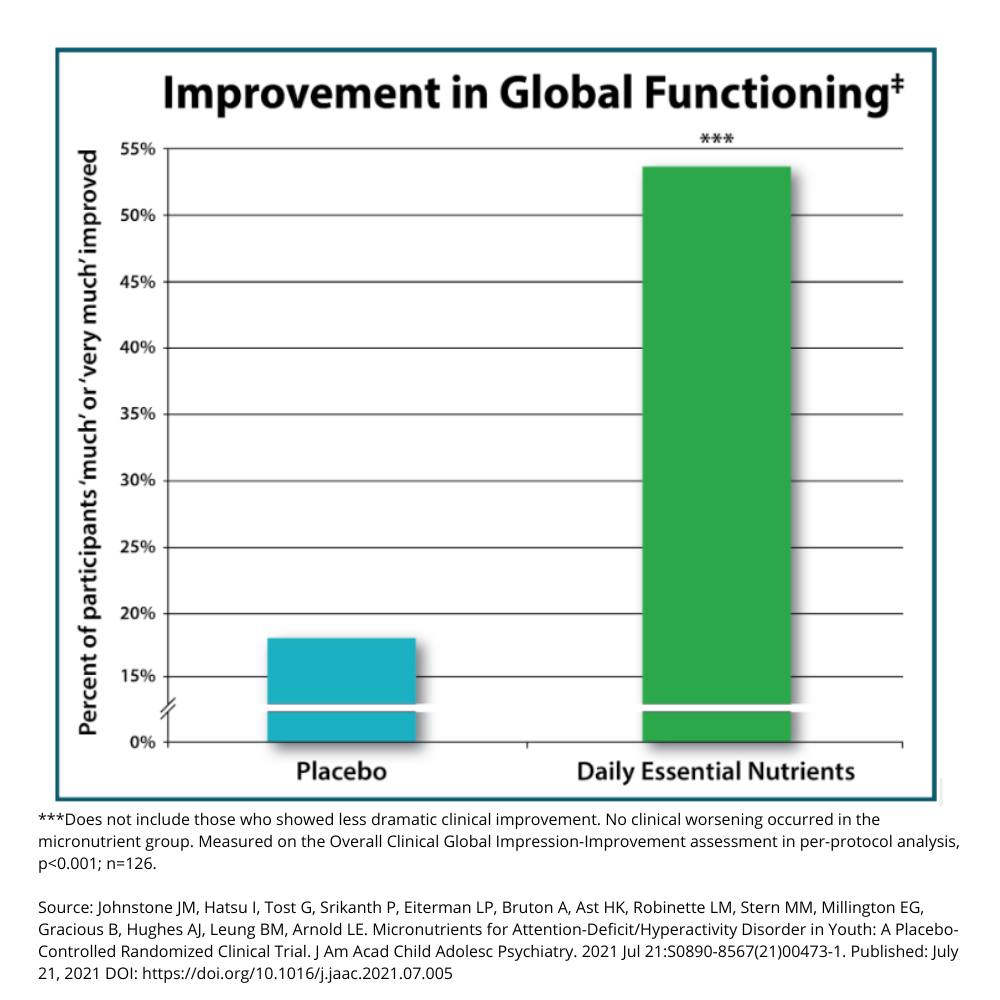A new double-blind study shows a clinical blend of micronutrients helps children with mood dysregulation and ADHD.


A new double-blind study supporting the safety and effectiveness of a clinical blend of vitamins and minerals for children with mood dysregulation and ADHD was recently published in the Journal of the American Academy of Child & Adolescent Psychiatry.
The study “Micronutrients for Attention-Deficit/Hyperactivity Disorder in Youth: A Placebo-Controlled Randomized Clinical Trial,” set out to evaluate whether a specialized micronutrient blend called Daily Essential Nutrients, formulated by Hardy Nutritionals®, benefits unmedicated children ages 6-12 who suffer from ADHD and irritability.
The ADHD symptoms targeted with the multinutrient treatment included focus, peer conflict, oppositional defiance, and disruptive mood dysregulation.
The double-blind, randomized, placebo-controlled trial design ensured that participants, their parents, clinicians, and researchers did not know who received the micronutrients or the placebo. This design is considered the "gold standard" of research.
The results showed that the micronutrient treatment provided “significant benefit” over placebo in children with ADHD and irritability. Participants taking Daily Essential Nutrients were three times as likely to be treatment responders ("much" or "very much" improved in overall symptoms) based on clinician ratings. The children in the multinutrient group showed less aggression toward peers. In contrast with standard ADHD treatments, which are known to cause growth suppression, participants in the multinutrient group also grew statistically significantly taller (6mm in only 8 weeks) compared to the placebo group.
The formulation was deemed safe by researchers. The children taking the specialized blend of micronutrients from Hardy Nutritionals® showed no differences in side effects compared to placebo. Despite the children taking 9-12 capsules per day, researchers stated, “The micronutrient treatment was both acceptable and well-tolerated, with a 93% retention rate...This finding is consistent with previous micronutrient studies.”
After the 8-week study period, researchers noted improvements in the following:
· Anxiety
· Aggression
· Irritable Mood
· Emotional Regulation
· Sleep
· Anger
This landmark double-blind study comes on the heels of two previous double-blind studies also carried out on Hardy Nutritionals®’ Daily Essential Nutrients, as well as many non-blinded micronutrient studies, which all showed marked improvements in study participants, including for symptoms such as anger and irritability.
There are currently three additional double-blind studies underway on Daily Essential Nutrients for mood and anxiety. Learn more about this formulation at Try.HardyNutritionals.com/focus
Source: Johnstone JM, Hatsu I, Tost G, Srikanth P, Eiterman LP, Bruton A, Ast HK, Robinette LM, Stern MM, Millington EG, Gracious B, Hughes AJ, Leung BM, Arnold LE. Micronutrients for Attention-Deficit/Hyperactivity Disorder in Youth: A Placebo-Controlled Randomized Clinical Trial. J Am Acad Child Adolesc Psychiatry. 2021 Jul 21:S0890-8567(21)00473-1. Published: July 21, 2021 DOI: https://doi.org/10.1016/j.jaac.2021.07.005
Funding: The research was carried out independently and funded through private donations to the Nutrition and Mental Health Research Fund managed by the Foundation for Excellence in Mental Health Care (FEMHC) and a direct grant from FEMHC and the Gratis Foundation. The authors also received support from the National Institutes of Health (NIH) National Center for Complementary and Integrative Health.
Institutional oversight: The study was approved by Institutional Review Boards at Oregon Health & Science University, The Ohio State University, the Conjoint Health Research Ethics Board at the University of Calgary for the University of Lethbridge; the US Food and Drug Administration, Health Canada, and was registered prospectively with the National Clinical Trials Registry. The clinical researchers involved in carrying out the research are associated with Ohio State University, Nationwide Children's Hospital, Oregon Health & Sciences University, and the University of Lethbridge.
